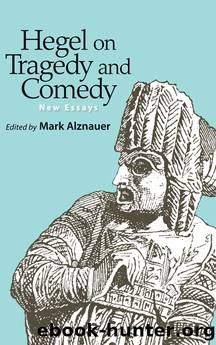Hegel on Tragedy and Comedy by Mark Alznauer;

Author:Mark Alznauer;
Language: eng
Format: epub
Publisher: State University of New York Press
Published: 2021-06-15T00:00:00+00:00
Comedy beyond Ancient Comic Drama
Hegelâs approach to comedy in the Phenomenology has been to unearth the significance of comic consciousness as it emerges at a specific moment in the reconstruction of the experience of religious consciousness. By way of conclusion, I would like to return to the fact that Socrates and Aristophanes arise together, after tragedy, in this reconstruction. What can we extrapolate from this about the âfateâ of comedy, beyond Hegelâs more narrow concentration on comic drama? And what does this say about comic consciousness as such, about a genuinely comic disposition toward the world? To begin addressing these questions, I will follow the lead of Bergson in his Laughter: An Essay on the Meaning of the Comic (1900) and turn to the three observations that he thinks are fundamental for guiding an investigation into the âcomic spiritâ:35
âthe absence of feeling ⦠usually accompanies laughter.â
âOur laughter is always the laughter of a group.â
âthe comic does not exist outside the pale of what is strictly human.â36
Let us consider these in the following order:
1.The detachment of comedy. Aristophanes and Socrates come on the scene when fate was completing âthe depopulation of Heaven,â and they both respond to this with detachment. The mimetic spell is broken. Nowhere is this more evident in Old Comedy than when the chorus addresses the audience directly in the parabases; and Socratesâs arguments against mimesis are well known, as is the fact that Platoâs presentation of Socrates in the dialogues resides somewhere between art and life.37 It is precisely this detachment, this emotional disinvestment, this absence of divine pathos, that characterizes comic elevation. Bergson writes, âthe comic demands something like a momentary anesthesia of the heart.â38 It demands the stance of the disinterested observer. Insofar as it is empathy or compassion that is anesthetized, this detachment certainly opens the door to the cruelty that can be expressed through laugher. Yet Hegelâs great admiration for Aristophanesâs comedy, as we have seen, stems in part from the playwrightâs ability to convey a sense of levity that undercuts this threat of cruelty. We see, then, a kinship with the stance of the Socratic philosopher: both are invested in the polis while also removed from it. That is to say, comedy shares with philosophy a disinterested, ultimately cognitive relation to itself and the world. Socrates is not overcome by the pathos of tragedy but is known, of course, for detached reflection and ironic distance.39 And in the same way that this depopulation was, according to Hegel, the condition of the possibility of the frank, self-consciously critical dimension of Aristophanic comedy, it also opens the space for Socrates to replace fate with the practice of philosophy.
2.The sociality of comedy. As the moment in âart religionâ when art comes to a self-consciousness of itself as art, comedy is for Hegel a vehicle for the collective enterprise of self-reflection and insight that is a unifying trait of the moments of Absolute Spirit. But what can we say about the object of this collective reflection?
Download
This site does not store any files on its server. We only index and link to content provided by other sites. Please contact the content providers to delete copyright contents if any and email us, we'll remove relevant links or contents immediately.
The European History Highway: A Guide to Internet Resources by Dennis A. Trinkle Scott A. Merriman(496)
The Seven Wonders of the Ancient World by Michael Denis Higgins(478)
European Security in a Global Context by Thierry Tardy(471)
European Security without the Soviet Union by Stuart Croft Phil Williams(470)
The Routledge companion to Christian ethics by D. Stephen Long Rebekah L. Miles(459)
Hudud Al-'Alam 'The Regions of the World' - a Persian Geography 372 A.H. (982 AD) by V. V. Minorsky & C. E. Bosworth(399)
Gorbachev And His Generals by William C. Green(391)
Get Real with Storytime by Julie Dietzel-Glair & Marianne Crandall Follis(390)
Tibetan Studies in Comparative Perspective by Chih-yu Shih Yu-Wen Chen(386)
Governance, Growth and Global Leadership by Espen Moe(382)
Hyperculture by Byung-Chul Han(379)
CliffsNotes on Fitzgerald's The Great Gatsby by Kate Maurer(360)
The Oxford History of the World by Fernández-Armesto Felipe;(354)
How Languages Are Learned 5th Edition by Patsy M Lightbown;Nina Spada; & Nina Spada(353)
The Egyptian Economy, 1952-2000 by Khalid Ikram(352)
Oral Poetry and Narratives from Central Arabia: The Poetry of Ad-Dindan : A Bedouin Bard in Southern Najd (Studies in Arabic Literature, Vol 17) (English and Arabic Edition) by P. M. Kupershoek P. Marcel Kurpershoek(345)
The Oxford Handbook of the Incas by Sonia Alconini(333)
Europe Contested by Harold James(320)
The Hutchinson Dictionary of Ancient and Medieval Warfare by Peter Connolly John Gillingham John Lazenby(306)
